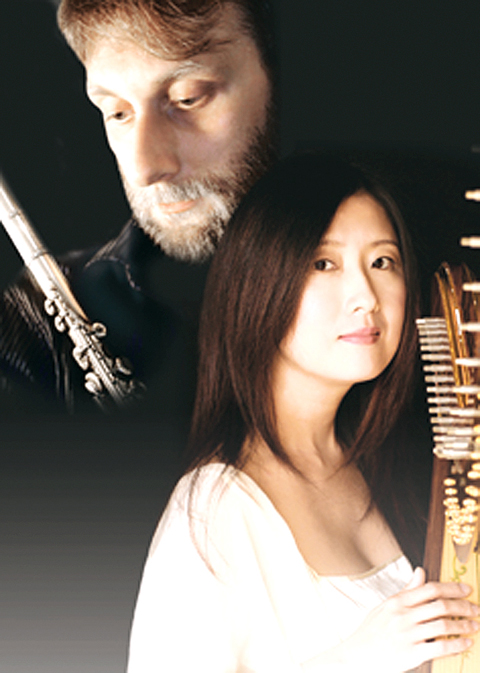This weekend’s classical highlights must be Andrea Bocelli’s mega-event in Taichung tomorrow evening, and the National Symphony Orchestra’s (NSO) Taipei concert featuring flute and harp on Sunday afternoon.
The Management for New Arts agency says it opted for Taichung Intercontinental Baseball Stadium for Bocelli’s only Taiwan appearance on his current weeklong Asia tour because the comparable Taipei venues were already booked. With its 18,000 seats, though, the open-air ground fits well enough with Bocelli’s international celebrity status. It may not be quite the Egyptian pyramids or the Statue of Liberty, both of which he’s sung in front of, but even so there are only some 2,000 seats still unsold. The famous blind tenor will arrive in Taichung from a vast arena in Tokyo, and go on to a similar one in Seoul.
When he was nominated for a Best New Artist Grammy in 1999, it was the first time a classical artist had been named in the category for 38 years, and Taichung is understandably pulling out all the stops for a crossover artist who’s sung alongside Kenny G, Lang Lang (郎朗) and Sarah Brightman. There are Bocelli packages, Bocelli dinners, and the apparent expectation that fans will all arrive by high speed rail. Free bus tours of the city will anyway leave from the high speed rail station.

PHOTO COURTESY OF NSO
Tomorrow the 49-year-old tenor, accompanied by the ever-wonderful Evergreen Symphony Orchestra, will sing an almost entirely classical program. There are operatic arias from Puccini, Verdi and Mascagni, followed by popular 19th-century songs culminating in O Sole Mio. Only Nessum dorma seems to be missing, but you can be fairly sure it’ll appear as an encore.
Meanwhile, in Taipei the NSO is offering a very attractive program featuring its principal flautist and principal harpist as soloists. Swedish-born Anders Norell and Taiwanese Shannon Shuen Chieh (解瑄) will play two concertos by the American composer Lowell Liebermann.
Liebermann’s 1992 Concerto for Flute and Orchestra and 1995 Concerto for Flute, Harp and Orchestra form the central massif of Sunday afternoon’s concert and both will be Taiwan premiers. Each was commissioned by none other than James Galway, who has also recorded them both.
Still only 47, Liebermann was described by Time magazine as “custom-made for listeners who find 12-tone music ugly and minimalism simple-minded.”
“Liebermann is a very melodic composer, with a brilliant ear for orchestration,” said Norell earlier this week. “The mix of tone colors is dazzling, like a kaleidoscope. Some hear movie music in it, but to me it’s more of a spiritual atmosphere. Of course it’s taxing for the flautist to play two works. Concentration and stamina must be kept to the fore!”
Taiwan is lucky that the NSO’s former music director Chien Wen-pin (簡文彬) still returns here — he’ll be in charge of Sunday afternoon’s concert, for which there are only some 200 tickets left unsold. Liebermann, incidentally, also wrote a Sonata for Flute and Harp in 1996. I wonder if we will hear part of this as an encore?
Andrea Bocelli performs at Taichung Intercontinental Baseball Stadium (台中洲際棒球場), 835 Chungteh Rd, Taichung City (台中市崇德路3段835號), at 7pm. Tickets range from NT$800 to NT$6,000 and are available through ERA ticket outlets, by visiting www.ticket.com.tw or by calling (02) 2341-9898.
The NSO concert is at 2:30pm at the National Concert Hall, Taipei City. Seats are from NT$300 to NT$1,500 and are available by calling (02) 3393-9888 or visiting www.artsticket.com.tw.

Last week, on the heels of the recall election that turned out so badly for Taiwan, came the news that US President Donald Trump had blocked the transit of President William Lai (賴清德) through the US on his way to Latin America. A few days later the international media reported that in June a scheduled visit by Minister of National Defense Wellington Koo (顧立雄) for high level meetings was canceled by the US after China’s President Xi Jinping (習近平) asked Trump to curb US engagement with Taiwan during a June phone call. The cancellation of Lai’s transit was a gaudy

From Godzilla’s fiery atomic breath to post-apocalyptic anime and harrowing depictions of radiation sickness, the influence of the nuclear bombings of Hiroshima and Nagasaki runs deep in Japanese popular culture. In the 80 years since the World War II attacks, stories of destruction and mutation have been fused with fears around natural disasters and, more recently, the Fukushima crisis. Classic manga and anime series Astro Boy is called “Mighty Atom” in Japanese, while city-leveling explosions loom large in other titles such as Akira, Neon Genesis Evangelion and Attack on Titan. “Living through tremendous pain” and overcoming trauma is a recurrent theme in Japan’s

As last month dawned, the Democratic Progressive Party (DPP) was in a good position. The recall campaigns had strong momentum, polling showed many Chinese Nationalist Party (KMT) lawmakers at risk of recall and even the KMT was bracing for losing seats while facing a tsunami of voter fraud investigations. Polling pointed to some of the recalls being a lock for victory. Though in most districts the majority was against recalling their lawmaker, among voters “definitely” planning to vote, there were double-digit margins in favor of recall in at least five districts, with three districts near or above 20 percent in

The great number of islands that make up the Penghu archipelago make it a fascinating place to come back and explore again and again. On your next trip to Penghu, why not get off the beaten path and explore a lesser-traveled outlying island? Jibei Island (吉貝嶼) in Baisha Township (白沙鄉) is a popular destination for its long white sand beach and water activities. However, three other permanently inhabited islands in the township put a unique spin on the traditional Penghu charm, making them great destinations for the curious tourist: Yuanbeiyu (員貝嶼), Niaoyu (鳥嶼) and Dacangyu (大倉嶼). YUANBEIYU Citou Wharf (岐頭碼頭) connects the mainland